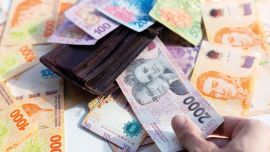Whether drought-stricken farmers would be denied export duty relief due to fiscal urgencies at precisely the time when they most need it hung in the balance as the week closed, but this question really forms part of a much bigger issue. Various arguments have already been advanced regarding the soy export duties – whether their maintenance is an imposition of the International Monetary Fund (IMF), whether agriculture should be favoured as a dynamic sector or whether it should also be contributing to the general sacrifice (not to mention turning in its export dollars at a faster rate during a currency crisis), etc. This could also be presented as yet another contradiction of the Mauricio Macri administration alongside first prioritising pensioners with the “Historic Reparation” and then slashing their increase percentages via the pension reform – Macri began his presidency with the immediate abolition of export duties on all farm produce and their phased elimination in the case of soy but now shows signs of leaning heavily on the sector. But this issue also falls into the bigger question of how to square the circle by reducing taxes and the fiscal deficit at the same time.
At first sight the choice facing taxation might seem whether to increase or reduce it but the question is not as simple as this either/or proposition, especially since neither is an option in the current Argentine context. In a very few words, the tax burden is too heavy to permit an increase and the fiscal deficit too wide to allow a reduction (while cutting public spending is so much easier said than done). Instead of either being increased or lowered, the tax system is crying out for a drastic reform based on an entirely different approach and here the question of export duties serves as a timely reminder of what is currently wrong. The export duties are a supreme example of taxing production within a system which also hits consumption hard in the form of such indirect levies as IVA value-added taxation when income should be at the centre of any progressive tax system.
Soy export duties obviously are limited to agriculture while the question of subsidy reductions tends to centre on the gas and electricity bills of simple householders now being so hotly debated in Congress. But perhaps the taxman should be paying more attention to the business sector as a whole. The latter are generally exempt from scrutiny because the tax burden on their turnover is too heavy in general and because of all the payroll surcharges on top of high labour costs (the price of defending and creating jobs) in particular – indeed if the proposed labour whitewash has any impact, these overheads could increase even more (always depending on the accompanying earnings tax deductions). But while everybody associates subsidies with transport fares and utility bills, business subsidies account for a surprisingly high percentage of the economy approximating the fiscal deficit – these breaks deserve a more critical view. The proposal to counter the increased payroll costs of legalising employment with less income taxation can only reinforce the Argentine syndrome of poor companies and rich businessmen.
The key to tax reform thus must surely be reducing the burdens on companies while tightening the taxation of the higher incomes. Indirect taxation and export duties were always the easy way out for the taxman in the past when compared to tracking down evasion but modern technology gives him less excuse. Argentina is on the brink of entering the Organisation for Economic Co-operation and Development (OECD) and yet direct taxation as a percentage of its economy is approximately a third of the OECD average – surely this criterion should also be satisfied in order to become a truly developed country.





















Comments